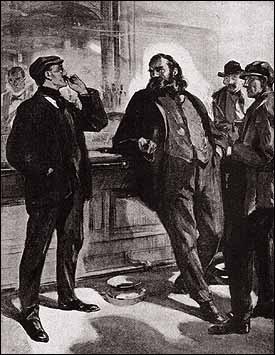| The Bodymaster 6 | The Bodymaster 7 |
The bar of McGinty’s saloon was crowded as usual; for it was the favourite loafing place of all the rougher elements of the town. The man was popular; for he had a rough, jovial disposition which formed a mask, covering a great deal which lay behind it. But apart from this popularity, the fear in which he was held throughout the township, and indeed down the whole thirty miles of the valley and past the mountains on each side of it, was enough in itself to fill his bar; for none could afford to neglect his good will.
Besides those secret powers which it was universally believed that he exercised in so pitiless a fashion, he was a high public official, a municipal councillor, and a commissioner of roads, elected to the office through the votes of the ruffians who in turn expected to receive favours at his hands. Assessments and taxes were enormous; the public works were notoriously neglected, the accounts were slurred over by bribed auditors, and the decent citizen was terrorized into paying public blackmail, and holding his tongue lest some worse thing befall him.
Thus it was that, year by year, Boss McGinty’s diamond pins became more obtrusive, his gold chains more weighty across a more gorgeous vest, and his saloon stretched farther and farther, until it threatened to absorb one whole side of the Market Square.
McMurdo pushed open the swinging door of the saloon and made his way amid the crowd of men within, through an atmosphere blurred with tobacco smoke and heavy with the smell of spirits. The place was brilliantly lighted, and the huge, heavily gilt mirrors upon every wall reflected and multiplied the garish illumination. There were several bartenders in their shirt sleeves, hard at work mixing drinks for the loungers who fringed the broad, brass-trimmed counter.
At the far end, with his body resting upon the bar and a cigar stuck at an acute angle from the corner of his mouth, stood a tall, strong, heavily built man who could be none other than the famous McGinty himself. He was a black-maned giant, bearded to the cheek-bones, and with a shock of raven hair which fell to his collar. His complexion was as swarthy as that of an Italian, and his eyes were of a strange dead black, which, combined with a slight squint, gave them a particularly sinister appearance.
All else in the man – his noble proportions, his fine features, and his frank bearing – fitted in with that jovial, man-to-man manner which he affected. Here, one would say, is a bluff, honest fellow, whose heart would be sound however rude his outspoken words might seem. It was only when those dead, dark eyes, deep and remorseless, were turned upon a man that he shrank within himself, feeling that he was face to face with an infinite possibility of latent evil, with a strength and courage and cunning behind it which made it a thousand times more deadly.
Having had a good look at his man, McMurdo elbowed his way forward with his usual careless audacity, and pushed himself through the little group of courtiers who were fawning upon the powerful boss, laughing uproariously at the smallest of his jokes. The young stranger’s bold gray eyes looked back fearlessly through their glasses at the deadly black ones which turned sharply upon him.
“Well, young man, I can’t call your face to mind.”

“I’m new here, Mr. McGinty.”
“You are not so new that you can’t give a gentleman his proper title.”
“He’s Councillor McGinty, young man,” said a voice from the group.
“I’m sorry, Councillor. I’m strange to the ways of the place. But I was advised to see you.”
“Well, you see me. This is all there is. What d’you think of me?”
“Well, it’s early days. If your heart is as big as your body, and your soul as fine as your face, then I’d ask for nothing better,” said McMurdo.
“By Gar! you’ve got an Irish tongue in your head anyhow,” cried the saloonkeeper, not quite certain whether to humour this audacious visitor or to stand upon his dignity.
“So you are good enough to pass my appearance?”
“Sure,” said McMurdo.
“And you were told to see me?”
“I was.”
“And who told you?”
“Brother Scanlan of Lodge 341, Vermissa. I drink your health, Councillor, and to our better acquaintance.” He raised a glass with which he had been served to his lips and elevated his little finger as he drank it.
McGinty, who had been watching him narrowly, raised his thick black eyebrows. “Oh, it’s like that, is it?” said he. “I’ll have to look a bit closer into this, Mister– –”
“McMurdo.”
“A bit closer, Mr. McMurdo; for we don’t take folk on trust in these parts, nor believe all we’re told neither. Come in here for a moment, behind the bar.”
| The Bodymaster 6 | The Bodymaster 7 |